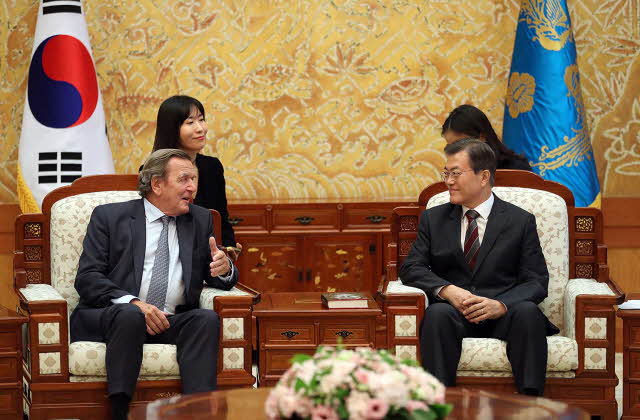이 웹사이트는 제19대 대통령 임기 종료에 따라 대통령기록관이 「대통령기록물 관리에 관한 법률」에 의해 이관받아 서비스하는 대통령기록물입니다. 자료의 열람만 가능하며 수정 · 추가 · 삭제는 불가능합니다.
다만, 「개인정보보호법」에 의하여 개인의 정보를 보호받기 원하시는 분은 관련 내용(요청자, 요청내용, 연락처, 글위치)을 대통령 웹기록물 담당자(044-211-2253)에게 요청해 주시면 신속히 검토하여 조치해 드리겠습니다. 감사합니다.
SPEECHES & REMARKS
BRIEFINGS

President Moon Jae-in met with former German Chancellor Gerhard Schroder for 35 minutes from 5:00 o’clock this afternoon. They exchanged views about the progress in Korea-Germany relations, social reform and the importance of endeavors to correctly understand what happened in history and to remember it.
President Moon congratulated Chancellor Schroder on the publication of the Korean version of his autobiography. He noted that discussions in the book about division, historic issues, comprehensive labor reforms and a phase-out of nuclear energy corresponded to the directions of policies being implemented by his Administration or were useful as references.
In addition, President Moon said that Germany had provided various types of economic assistance to help Korea achieve the Miracle on the Han River. He underscored the fact that Germany also contributed to the democratization of Korea as seen in such examples as German journalist Jurgen Hinzpeter who informed the world about the Gwangju Uprising for the first time and the 1980 campaign of the German Bundestag to save the life of Kim Dae-jung, who went on to become the President of the Republic of Korea.
President Moon said that Germany’s sincere apology for its past wrongs and the efforts to reconcile and cooperate with neighboring countries spoke volumes about the situation in Northeast Asia. Chancellor Schroder responded by saying that it only stood to reason that people today take to heart responsibilities for historical wrongdoings and make apologies. He continued to say that squarely facing the past lays the foundation for the development of genuine cooperation among countries concerned.
Explaining about his visit to the House of Sharing, a shelter for the surviving victims of sexual enslavement by the Imperial Japanese Army, Chancellor Schroder said he was deeply touched by one resident`s remark that she had no hatred and that what she wanted is not to take revenge but just an acknowledgement of what happened in the past. He showed a bracelet designed to remember the victims that the resident put on his wrist. Speaking of watching the movie, A Taxi Driver, the Chancellor said the desperate efforts by young people to gain democracy, even risking their lives, were truly impressive.
In response, President Moon said he had also watched the movie, which served as an opportunity for him to revisit the noble sacrifices and courage of the citizens of Gwangju. The President went on to say that German journalist Hinzpeter`s endeavors to cover and report what really happened in Gwangju at the risk of his life were of great help in preserving the spirit of Gwangju in 1980. He next expressed his appreciation to Germany for making efforts for the sake of democracy in Korea at critical junctures. The President went on to say that the Gwangju Democratization Movement, though it had been regarded as a frustrated attempt at that time, finally paved the way for democracy in Korea and also served as a source of inspiration for the recent candlelight rallies, which helped put a collapsed democracy in Korea back on the right track.
President Moon noted that the recommendation by the Hartz Commission established by the Chancellor of comprehensive labor reforms revived the German economy and restored its competitiveness so that it became the strong driving force behind the German economy to this date. He added that many people would remember the Chancellor’s achievement for a long time.
In reply, Chancellor Schroder said the Moon Jae-in Administration’s attempt to strike a grand social compromise through the Economic and Social Development Commission was obviously the right thing to do as evident in the case of Germany, adding that at the same time, he was well aware of how difficult it is to pursue it. Mentioning that President Moon’s seeking a grand social compromise, however, was certainly worth doing, the Chancellor said the proper attitude of a political leader was to overcome reality with a vision for the country and the future of the people. The Chancellor went on to say that the results of reforms would be evident several years later, but his experience told him that the decision for the reforms should be made immediately.
Mentioning that the new Administration’s current plan to raise the minimum wage, create jobs by reducing working hours and promote income-driven, inclusive growth constituted changes in the existing economic paradigm, President Moon said it was true that there were some people who were anxious about it. He went on to say that the important task would be to ease the anxiety through communication and persuasion and move forward. He continued that he would like to instill confidence in the public that though the results would only be felt after several years, the reforms would surely be successful.



